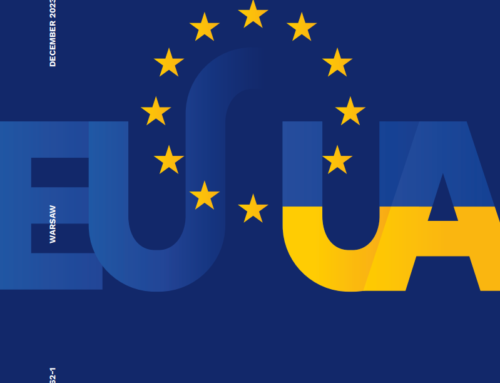Trade decoupling and limited de-dollarisation are on the horizon
Opublikowano: 30/11/2023
We conducted a survey among prominent European economists on trade dislocation, economic globalisation trends and the future of Western currencies. According to our respondents, some reshoring is excepted to occur, potentially reducing the EU's reliance on Chinese imports, though this might come at a cost. While the economists foresee a slight decrease in the share of the EUR and USD in global reserves, complete de-dollarisation is not expected. The EUR's position seems more vulnerable than that of the US dollar.
The European Commission has published its outlook on trade, which points to potential decoupling between the Western Hemisphere and Asia. There is a major focus on the growing role of China and India in the global economy and the lower share of EUR and USD in export invoicing. However, our survey of European economists indicates that the effects will be slow and rather limited.
The economists expect that the BRICS enlargement will not affect the share of USD and EUR in global foreign exchange reserves significantly. A majority of respondents (52%) expect no impact at all and another 38% expect just a slight decrease in the Western currencies’ importance. In particular, they note the lack of institutional stability and confidence in the Chinese CNY, as well as the limitations of China’s bond market. Some respondents note that while de-dollarisation will simply not occur, the EUR’s position in global trade is more at risk. In addition, the economists who expect a reduction in the share of USD or EUR in global reserves attribute this to Asian economies’ economic convergence, rather than the BRICS enlargement.
“I expect a slight decrease, but no major shifts in the prevalence of EUR and in particular USD. The USD is unique and cannot be replaced in the foreseeable future,” said Debby Lanser, an economist at the Netherlands Bureau for Economic Policy Analysis.
“The EUR and USD are unrivalled when it comes to liquid reserve assets, convertibility and global banking sector exposure. Challenging them would require stable economic and legal conditions (including full convertibility) within the BRICS, something that is not around the corner at all,” points out Gunter Deuber, head of research at Raiffeisen Bank.
“I do believe that in the longer term the relative importance of EUR and USD assets will decline, but this will be because other markets are generally growing more rapidly, rather than due to the BRICS enlargement per se,” notes Jan-Egbert Sturm, a professor at ETH Zurich and director of the KOF Institute.
Reshoring could help reduce the trade deficit between the EU and China. 48% of the respondents in our survey hold this view. In contrast, 24% expect that this will not occur, and 28% are not sure. The respondents point to the diversification from China, but note that the process is slow and incomplete; it often means swapping dependence on some Chinese products for others. In addition, some of the sceptical respondents seem to suggest that the source of the trade deficit are the low labour costs and weak domestic demand in China — reshoring policies have had a limited impact on this imbalance.
“Diversion away from China is moving slowly and the trade pattern between EU and China will also be influenced by Chinese policies aimed at substituting Western tech imports with domestic production. Even if the EU can reduce the share of (direct) imports from China, Chinese value added may still be incorporated in many imports now sourced from elsewhere.” says Klaus-Jürgen Gern, an economist at the Kiel Institute for the World Economy.
“If Europe manages to reshore substantially, we can expect an improvement in the trade balance. However, the question is whether Europe will be able to do so. There has been a lot of talk about reshoring, but there are also limited resources and they would largely prevent Europe from any large-scale reshoring exercise. And if this really happens, then Europe’s export capabilities would probably shrink,” points out Jan Hagemejer, macroeconomics and trade director at CASE Research.
“As far as businesses are concerned, the geographical location of their investment will always be strongly influenced by efficiency and return prospects. As far as the EU is concerned, the essential challenge is to have a competitive market and regulatory environment, ensuring attractive return prospects. Protective barriers would become harmful to the EU in the first place,” claims Pavel Štěpánek, a member of the supervisory board at Fondee and former member of the Bank Board of the Czech National Bank.
Less stable international trade is likely to limit Germany’s economic growth. Finally, we asked the economists to what extent risks in trade could contribute to the sustained weakening of Germany’s GDP growth, below the eurozone average. 45% of them attributed considerable weight to these risks, while another 41% attributed moderate weight to them. Just 14% of the economists surveyed expect trade dislocations to have a relatively minor impact on Germany’s economic growth potential. Some respondents draw attention to the energy costs associated with the transition and the shutdown of nuclear power plants. In addition, the economists surveyed highlight problems relating to fiscal policy and domestic demand.
“Although the disintegration of trade poses a serious risk to the outlook for the German economy, there are additional risks that should not be overlooked in this context and that are not directly related to trade disintegration, such as German carmakers’ declining competitiveness. Perhaps Germany will rethink its longstanding model focused on export performance and boost domestic demand, and increase public investment to boost its economic growth in times of decreasing global trade volumes,” says Jaromir Baxa, a professor of economics at Charles University in Prague.
“Decoupling is not on the agenda. Derisking and nearshoring are alternative options to reshoring production to Germany. If Germany can trade less with China (this must not be taken for granted), other trade partners will be available for diversification. We will not have de-globalisation; rather, it will be a different globalisation,” argues Jürgen Matthes, head of International Economic Policy at the German Economic Institute.
“German industry is losing competitiveness. Production in energy-intensive sectors has dropped by 10% and a rebound is unlikely — this is weighing on exports. The situation in the automotive industry is also puzzling. Moreover, future activity is likely to be hampered by tight environmental policy,” concludes Jakub Rybacki, head of Macroeconomic Team at the Polish Economic Institute.
About us:
The Polish Economic Institute (PEI) is a public economic think tank dating back to 1928. Its research areas are primarily macroeconomics, energy and climate, foreign trade, economic foresight, digital economy and behavioural economics. The Institute prepares reports, analyses and recommendations on key areas of the economy and social policy in Poland.
The Kiel Institute for the World Economy (IfW Kiel) is the leading research institute in Germany for globalisation issues. Its researchers investigate the drivers and effects of international economic activity, the integration and disintegration of global markets, as well as the opportunities and limits of political action in open economies.





